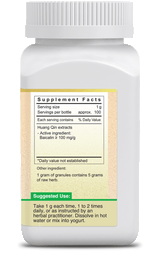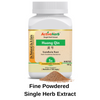Herbal Information on Scutellaria Root in Concentrated Granules
Comprehensive Guide to Huang Qin (Scutellaria Baicalensis)
Huang Qin, also known as Scutellaria Baicalensis or Chinese Skullcap, is a perennial herb highly esteemed in Traditional Chinese Medicine (TCM) for its extensive therapeutic properties. It belongs to the Lamiaceae family and is native to China, where it has been utilized for centuries to address a myriad of health conditions. This article delves deeply into the characteristics, benefits, and applications of Huang Qin, highlighting why this herb holds a prominent place in holistic health practices.
Botanical Profile of Huang Qin
Huang Qin is characterized by its vibrant yellow roots, which are the primary part used in medicinal preparations. The plant grows to a height of 30-50 centimeters and produces small blue or purple flowers. It thrives in well-drained, sandy soils and prefers a sunny location, making it well-suited to temperate climates.
Chemical Composition
The therapeutic efficacy of Huang Qin is attributed to its rich phytochemical profile, which includes:
- Flavonoids: Baicalin, baicalein, and wogonin are the primary active compounds known for their anti-inflammatory, antioxidant, and antimicrobial properties.
- Phenolic Acids: Known for their antioxidant activity, they help in protecting cells from oxidative stress.
- Tannins: These compounds have astringent properties that aid in reducing inflammation and controlling bleeding.

Health Benefits of Huang Qin
Anti-Inflammatory Properties
Huang Qin is renowned for its potent anti-inflammatory effects, which can be attributed to the flavonoids baicalin and baicalein. These compounds inhibit the production of inflammatory cytokines and enzymes such as COX-2, making Huang Qin effective in managing conditions like arthritis, inflammatory bowel disease, and chronic inflammatory conditions.
Antioxidant Activity
The antioxidants in Huang Qin help in neutralizing free radicals, thereby reducing oxidative stress and protecting the body against various chronic diseases, including cardiovascular diseases and cancer. Regular intake of Huang Qin has been associated with improved cellular health and a reduced risk of age-related conditions.
Antimicrobial and Antiviral Effects
Huang Qin exhibits broad-spectrum antimicrobial activity against a range of bacterial and viral pathogens. It is particularly effective against Staphylococcus aureus, Escherichia coli, and certain strains of influenza virus. This makes Huang Qin a valuable herb in preventing and managing infections.
Liver Support and Detoxification
The liver-protective properties of Huang Qin are well-documented. It aids in detoxifying the liver, promoting bile flow, and protecting against liver damage caused by toxins and heavy metals. This makes it beneficial for individuals with liver conditions such as hepatitis and fatty liver disease.
Cardiovascular Health
Huang Qin supports cardiovascular health by improving blood circulation, reducing blood pressure, and preventing the formation of atherosclerotic plaques. The herb’s ability to modulate lipid levels also contributes to its cardiovascular benefits, making it a suitable natural remedy for heart health.
Traditional and Modern Uses of Huang Qin
In Traditional Chinese Medicine
In TCM, Huang Qin is used to clear heat, dry dampness, and detoxify the body. It is commonly included in formulations for conditions such as:
- Respiratory Infections: To reduce fever, cough, and phlegm.
- Gastrointestinal Disorders: To treat diarrhea, dysentery, and abdominal pain.
- Skin Conditions: To manage eczema, boils, and abscesses.
Modern Applications
In contemporary herbal medicine, Huang Qin is used in supplements and herbal teas. It is often combined with other herbs to enhance its therapeutic effects. Modern research continues to explore its potential in managing chronic diseases, and neurodegenerative conditions.
 How to Use Huang Qin Concentrated Granules
How to Use Huang Qin Concentrated Granules
What are Huang Qin Concentrated Granules?
Huang Qin, also known as Scutellaria Baicalensis or Chinese Skullcap, is a popular herb in Traditional Chinese Medicine (TCM). Concentrated granules are a modern preparation of Huang Qin, offering a convenient and effective way to consume this beneficial herb. These granules are made by extracting the active components of the herb and then drying them into a powder that can be easily dissolved in water.
Benefits of Using Concentrated Granules
- Ease of Use: Quick and easy to prepare.
- Accurate Dosage: Ensures a consistent and precise amount of active ingredients.
- Enhanced Absorption: The extraction process often enhances the bioavailability of the active compounds.
Recommended Dosage
The typical dosage of Huang Qin concentrated granules can vary based on individual health needs and the concentration of the granules. However, a common recommendation is:
- Adults: 3 to 5 grams per day, divided into 2 to 3 doses.
- Children: Dosage should be adjusted based on age and weight, usually half the adult dose.
Always follow the dosage instructions provided by a healthcare provider or on the product label, as the concentration of the granules can vary between brands.
How to Prepare Huang Qin Concentrated Granules
-
Measure the Granules: Use a measuring spoon to get the recommended amount of Huang Qin granules.
-
Mix with Water: Add the granules to a cup and pour hot water over them. Stir until the granules are completely dissolved. The usual ratio is about 1 gram of granules to 50-100 ml of water.
-
Consume Immediately: Drink the mixture immediately after preparation. This ensures that you get the full benefit of the active ingredients.
Tips for Consumption
- Flavoring: Huang Qin can have a bitter taste. You can add a small amount of honey or lemon to improve the flavor.
- Consistency: For best results, take Huang Qin granules consistently, preferably at the same times each day.
- On an Empty Stomach: It is generally recommended to take herbal remedies on an empty stomach for better absorption.
Storage Instructions
- Keep in a Cool, Dry Place: Store the granules in an airtight container away from direct sunlight and moisture.
- Avoid Contamination: Use a clean, dry spoon each time you measure the granules to avoid contamination.
Potential Side Effects and Precautions
- Mild Gastrointestinal Discomfort: Some people may experience stomach upset or diarrhea.
- Allergic Reactions: Rarely, allergic reactions such as rash or itching may occur.
- Drug Interactions: Huang Qin can interact with certain medications, such as blood thinners. Consult with a healthcare provider before use if you are taking other medications.
Common Name: Skullcap Root, Baiscal skullcap root, Scutellaria, Scute
Botanical Name: Scutellaria baicalensis radix
Channels/Meridians: Gallbladder, Liver, Lung, Stomach
Pin Yin Name: Huang Qin
Other Ingredients: Dextrin (non GMO corn)
Package Size: 100 g (3.5 oz.) Extract granules, equal to 500 g (1.1 lb) dried raw herb.
Form: Single Herb Extract Powder
Concentration Ratio: 5x Concentration, 90% extract + 10% maltodextrin
Active Ingredients: Baicalin ≥ 100 mg/g
Origin: China
Brand: Activeherb
Naturally Occurring Components: flavonoids, β-sitosterol, campessterol, stigmasterol, proline, glucose, sucros
Additional Information about Huang Qin
 Benefits of Huang Qin Scutellaria Root
Benefits of Huang Qin Scutellaria Root
- Has been used for centuries in traditional Chinese medicine and has a wide range of beneficial properties.
- It has therapeutic benefits for several medical conditions.
- Clears Heat
- Sedates liver yang rising
- Dries dampness
- Drains fire
Product Properties: Bitter, Cold
Huang Qin Combines With:
+Notoginseng
+Gardenia
+Rhubarb
+Schizonepeta
Traditional Chinese Herbs
Chinese Traditional herbs should be regarded as an added feature to modern western healthcare, and not as a replacement. Chinese traditional herbs (Teas) emphasize harmony, and balance.
Reference:
alternativehealing.org
https://liftmode.wordpress.com/2017/06/13/top-7-baicalin-benefits-chinese-skullcap-huang-qin-scutellaria-baicalensis-hooded-willow-herb/
https://tcmwiki.com/wiki/huang-qin
https://www.ncbi.nlm.nih.gov/pmc/articles/PMC5031759/#:~:text=Scutellaria%20baicalensis%20Georgi%2C%20or%20Chinese,baicalensis.
https://www.phoenixmedical.com/huang-qin
https://www.americandragon.com/Individualherbsupdate/HuangQin.html
https://www.mskcc.org/cancer-care/integrative-medicine/herbs/scutellaria-baicalensis























